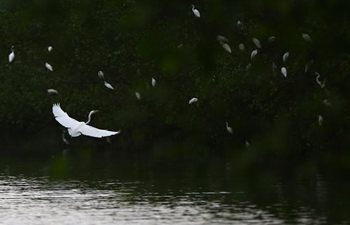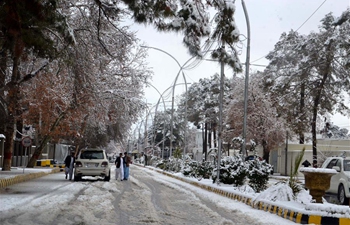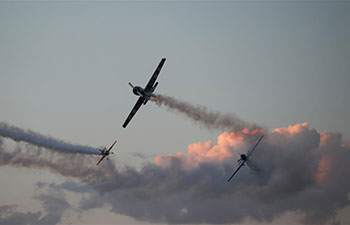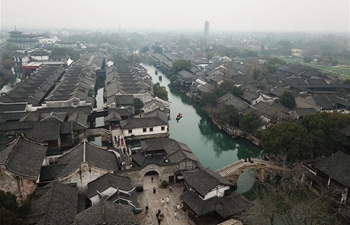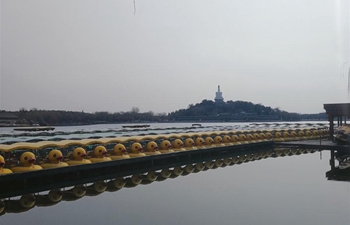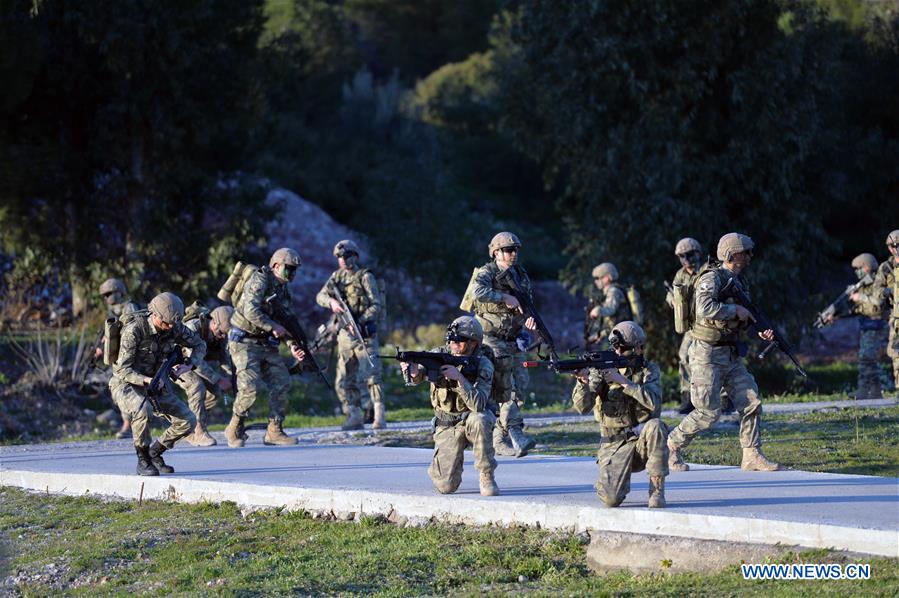
Soldiers take part in a naval exercise dubbed the Blue Homeland 2019 in Izmir, Turkey, on March 4, 2019. The largest ever drill conducted by the Turkish Navy is seen by analysts as a sign of both Ankara's determination to protect its territorial and gas exploration rights in the Mediterranean Sea and the rebound of the navy from the fallout of a failed coup in 2016. (Xinhua/Mustafa Kaya)
ISTANBUL, March 3 (Xinhua) -- The largest ever drill conducted by the Turkish Navy is seen by analysts as a sign of both Ankara's determination to protect its territorial and gas exploration rights in the Mediterranean Sea and the rebound of the navy from the fallout of a failed coup in 2016.
The message sent by the drill is that Turkey is ready to protect its maritime interests and exclusive economic zone, said Celalettin Yavuz, a security and foreign policy analyst with Istanbul Ayvansaray University.
The naval exercises, launched on Feb. 27, are being conducted simultaneously for the first time in all the three seas surrounding the country, namely the Mediterranean, the Aegean and the Black Seas.
The drill came at a time of rising tension due to gas exploration rights off southern Cyprus between Turkey and its neighbors, Greece and the Republic of Cyprus.
The exercises involving fighter jets, helicopters and land forces are widely seen as a display of Turkey's rapidly growing naval power.
"Considering the big number of vessels involved and the fact that the drills are being carried out simultaneously in all the three seas, the drills represent a challenge, a show of force by Ankara against the Greek side," said Cahit Armagan Dilek, director of the Ankara-based 21st Century Turkey Institute.
The seven-day drill, dubbed the Blue Homeland 2019, is the largest in the history of the Turkish Republic involving a record 103 navy ships.
As the name of the drill suggests, Ankara is making clear about its readiness to pursue its maritime interests as strongly against the unilateral steps by the Greek side, remarked Dilek, a former captain in the Turkish Navy.
However, he also argued that it is difficult to see the drill as a major show of force against Greece in the Aegean, as the exercises appear to include no action around the disputed islands under Greek possession.
Firing drills should have been carried out in the international waters around the disputed islands if the drill intends to send out a message to Greece and indicate its refusal to accept any attempt by Athens to extend its territorial waters from six to 12 miles, Dilke said.
For Athens, the ownership of the disputed islands in the Aegean, some of which are quite close to the Turkish mainland, is not an issue to be negotiated about.
Ankara, however, questions the Greek sovereignty over the islands numbering as many as 152 in total, saying the issue remains a grey area legally and should be resolved through talks.
Unlike Dilek, Yavuz does not feel the disputed islands in the Aegean should necessarily be a focus of the Blue Homeland drill.
The exercises essentially focus on protecting Turkey's exclusive economic zone, maritime trade lines and ports, he said.
The fleet joining the exercises includes 13 frigates, seven submarines, six corvettes, 16 assault boats, seven mine-hunting vessels, 14 patrol boats and other vessels.
The drill also serves to indicate that the Turkish Navy has managed to get over the damage inflicted by the coup attempt in July 2016, both analysts agree.
The exercises are proof enough that the navy is getting increasingly stronger in the wake of the failed coup, said Yavuz.
According to press reports, over 2,600 navy staff were expelled from the Turkish Navy either over their suspected involvement in the coup bid or their suspected links with the group led by U.S.-based Turkish cleric Fethullah Gulen blamed for the putsch.
A great majority of those sacked were commissioned and non-commissioned officers, including 30 admirals.
In this context, the drill is presenting a force that has gotten over the crushing impact of the failed coup and is back with full powers, remarked Dilek.
Amid protests by Ankara and the Turkish Cypriots on the divided island of Cyprus, the Greek Cypriots are tapping rich natural gas reserves off southern Cyprus in cooperation with some leading energy companies.
"No activity can be carried out in the Mediterranean without Turkey, and we would never allow that," Turkish Foreign Minister Mevlut Cavusoglu said last month in allusion to the Greek Cypriots' efforts to drill for gas.
Ankara takes the Cyprus issue and gas exploration in the area strategically, the minister stressed.
The Republic of Cyprus, which only represents the Greek Cypriots in the south of the island, concluded long ago bilateral maritime border demarcation agreements with Israel, Egypt and Lebanon.
Turkey, which is yet to declare its own exclusive economic zone (EEZ) in the Mediterranean, says the EEZ declared by the Greek Cypriots partly overlaps with its own and that of northern Cyprus.
"If this drill is to be seen as an act of intimidation, then Greece, the Greek Cyprus Administration and Israel may be the countries at the receiving end," said Yavuz, a former captain in the Turkish Navy.
Israel has joined forces with Greece and the Republic of Cyprus to construct an undersea pipeline to carry Cypriot and Israeli natural gas to Europe.
Cyprus was split along ethnic lines in 1974, when Turkey intervened militarily following a military coup by Athens-backed Greek Cypriots.
Ankara argues that the Turkish Cypriots, who inhabit northern Cyprus, should have a share of the revenues from the sale of gas to be drilled off the island, while Nicosia says the Turkish side would get its share after the reunification of the island.
Firing drills off southern Cyprus, part of the ongoing exercises, are sending the Greek Cypriots the message that their gas exploration activities are being closely watched by Ankara, said Dilek.


